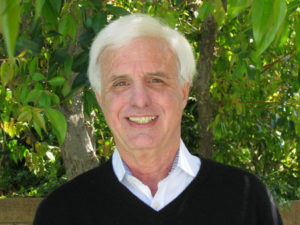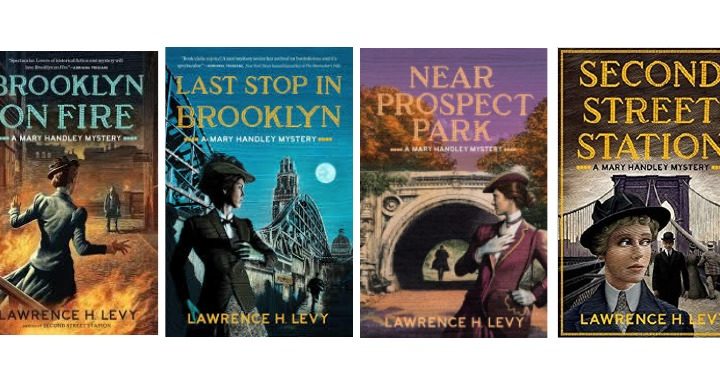Interview with Lawrence H. Levy: “I’m at an age where the money isn’t as important as telling my story the right way.”
AFG: How did the whole entertainment industry work start for you?
LL: I started out wanting to be an actor, and after college I studied at the Neighborhood Playhouse with Sanford Meisner (By the way, I didn’t know I was going to be a writer then, but acting and especially Meisner’s method is extremely helpful to writers. David Mamet also studied there). I got acting work, but after 6 years or so, I became tired of the physical nature involved in getting it. I’d walk into a casting office and immediately know when the casting person looked at me, before I spoke a word, whether I had a chance at the role or not. I had secretly always wanted to write, but my English professors at Cornell psyched me out with lifting the greats like Hemingway, Fitzgerald, Shakespeare, etc. onto such high pedestals that I felt inadequate. I looked around Hollywood at the time, saw the quality of the writing, and decided I could do that. I was extremely fortunate in that I sold the first script I wrote. I took it as a sign and never stopped.
AFG: Is Larry David like the Curb Larry?
LL: In some ways yes, but in most ways no. Is Larry kinda neurotic? Yeah, but who isn’t? He was once quoted saying that the “Curb” character is an exaggeration of himself and that he says and does things that he would only think about saying or doing but never act on them. I give him more credit than that. He may cringe at my saying this, but he’s actually a very loyal, generous guy.
AFG: Do you still work in TV?
LL: Yes, but not as much as before. Writing novels is time consuming and even more important, very fulfilling.
AFG: Why did you decide to write historical mysteries?
LL: I was helping my son with a term paper and came across the Edison/Tesla feud over the electricity market. I thought it would be interesting telling that story in the context of a real murder that happened back then. I also was aware that, because of the expense, Hollywood didn’t buy period pieces unless they came from another medium or a huge star actor or director was attached. While doing research, I came upon Mary Handley, who was hired by the Brooklyn Police Department to sleuth a high profile murder when there were no policewomen back then. That really fascinated me. As I crafted Mary’s character, I fell in love with her and she took over the book, making the Edison/Tesla story secondary. I also threw in the early marketing of Coca-Cola, which had cocaine in it. I had never written a book before, but that didn’t stop me nor did the odds. I loved the story that much. And that’s the way my first Mary Handley Mystery, Second Street Station, was born. Again, I was very fortunate. I got a book agent relatively quickly, and before I knew it, I had four publishers bidding for it. They all loved Mary.

Lawrence H. Levy
AFG: You have a great knowledge of historical New York, how did that come about?
LL: Research, research, research. I was born in Brooklyn and raised in New York City, but there were many facts I learned in my research that I hadn’t learned in school.
AFG: How can you compare TV to the world of writing, that is in the form of how aggravating they both can be?
LL: In a sports comparison, TV is like a team sport and to borrow a title of an old film, writing novels is like “The Loneliness of the Long Distance Runner.” For budgetary reasons in TV, things move at a fast pace and there’s always someone giving you notes, whether it’s the show-runner, your fellow writers, the production company or the network. The script is bound to go through a lot of changes. Then you have to depend on the director and actors to complete your vision. Sometimes they accomplish that and sometimes they show insight that makes it even better, but more often you’re disappointed in the result. In novel writing, it takes me ten months to a year to write a book where TV happens in a matter of weeks. The creative struggle is longer, but I feel novels are more rewarding. You don’t have to depend on anyone else to interpret your vision. You decide what the character does, feels, and thinks. I’ve also been lucky with my editors in that their notes have been relatively minor.
AFG: Is there talk of a TV adaptation of your books?
LL: There are talks going on that I can’t divulge now, but I will say that Warner Brothers had optioned it for a series, but I didn’t like what they wanted to do with it, so I pulled it. Obnoxious of me? Maybe, but I’m at an age where the money isn’t as important as telling my story the right way.
AFG: Who are the writers you enjoy reading?
LL: I’ll just mention one because he is by far my favorite: William Goldman. His Princess Bride and Marathon Man are textbooks on how to write those genres.
AFG: What are the TV shows you enjoy?
LL: They’re not all current. Mad Men was a great show and especially satisfying because my daughter wrote on it. I’m eagerly awaiting the next season of Bosch. I also like Fargo, Breaking Bad, and Better Call Saul. As far as comedies are concerned, of course, Seinfeld, 30 Rock, The Office, and there are parts of Arrested Development that make me howl with laughter. Jessica Walters’ character is especially funny.
AFG: Have you had that special person to encourage you to write?
LL: Not really, though I do have friends who I trust with proofing my work before it goes out. My daughter is my litmus test. If she likes it, I know I have something.
AFG: Do you outline?
LL: I feel you have to. It doesn’t have to be extensive, but you have to know basic story points. In the case of mysteries, you need to figure out what the murder is and how it takes place, who your villain(s) are and their motives, how your protagonist discovers him/her and all the believable red herrings who could have done it. I like to end chapters like act breaks in TV: with a surprise or plot twist. In TV, it’s to get the audience back after the commercial break. In books, I feel it keeps the reader reading.
AFG: What comes first, character or plot?
LL: That’s like the “chicken or the egg” question. In TV, I would definitely say the character. You try to think of something that would happen to that character to which he/she might respond in an interesting or funny way. In historical fiction/mysteries like my Mary Handley Series, it’s a little different. I like to find real historic events or real murders of the time and throw Mary into the middle of them. In my most recent novel that just came out, Near Prospect Park, I put Mary on the trail of a real person at that time, part of the wealthy and prestigious “400”, who would drug and rape teenage girls. Sound like something today? It’s amazing how long this has been going on.
AFG: What are you working on now?
LL: While waiting to do my next Mary Handley, I’ve come up with what I think is a very interesting modern female detective who cares for her father with early onset Alzheimer’s. She also has an unusual handicap. I know the case (based on a real event), how she gets involved, and how she solves it. That’s really all I can say for now.
AFG: Why is New York so damned fascinating?
LL: No matter how much gentrification takes place, New York is and will always be the “Great Melting Pot.” Cultures collide there, making for interesting people, stories, and great art. Expense and the huge population make it hard to survive there, and those struggles make interesting storytelling.

